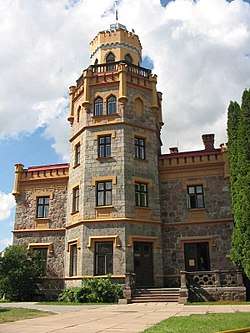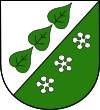Sigulda
Sigulda (![]()
Sigulda | |
|---|---|
Town | |
 Castle at Sigulda | |
 Flag  Coat of arms | |
 Sigulda Location in Latvia | |
| Coordinates: 57°09′N 24°52′E | |
| Country | |
| District | Sigulda Municipality |
| Town rights | 1928 |
| Government | |
| • Mayor | Uģis Mitrevics |
| Area | |
| • Total | 18.2 km2 (7.0 sq mi) |
| Population | |
| • Total | 16,679 |
| Time zone | UTC+2 (EET) |
| • Summer (DST) | UTC+3 (EEST) |
| Postal code | LV-2150 |
| Calling code | +371 67 |
| Number of city council members | 15 |
Overview
Sigulda is on a picturesque stretch of the primeval Gauja river valley. Because of the reddish Devonian sandstone which forms steep rocks and caves on both banks of the river, Sigulda has been called the "Switzerland of Vidzeme".
After the restoration of Latvian independence in 1991, an emphasis was placed on conserving Sigulda's public monuments and parks as well as improving the town's tourist sector. Supported by the town council, a traditional Opera Festival takes place in an open-air music hall in the castle ruins each summer. A Town Festival is celebrated in May when cherry trees blossom, while Sigulda is known for the colors of its trees in autumn. Sports such as skiing, bobsledding, and the luge are popular in wintertime and bungee jumping is practiced during the rest of the year.
The Gutmanis Cave lies halfway between Sigulda Castle and Turaida Castle and has a small stream flowing from it. It is the largest cave in the Baltics, measuring 19 m (62.34 ft) deep, 12 m (39.37 ft) wide and 10 m (32.81 ft) high. The cave still bears inscriptions from as early as the 17th century; drinking the water is supposed to be healthy and is said to increase one's lifespan. From the cave it is possible to climb into the hills and take the cable car over the river valley.
The town's population has been growing every year since 2000. 86% of the population is Latvian, 9% Russian, 3% Belarusian, 2% others. In 2007 Sigulda celebrated its 800th anniversary.
Points of interest
Twin towns — sister cities
Sigulda is a member of the Douzelage, a town twinning association of towns across the European Union. This active town twinning began in 1991 and there are regular events, such as a produce market from each of the other countries and festivals. As of 2019, its members are:[1]









.svg.png)

















- Other twinnings[2]
Notable people
- Milda Lauberte – Latvia's leading female chess player for decades
- Sandis Ozoliņš – Latvian ice hockey player, Stanley Cup champion
- Andris Šics – Latvian luger, who has won a silver medal in the men's doubles event at Vancouver in 2010 and two bronze medals at Sochi in 2014 with his brother Juris Šics.
- Juris Šics – Latvian luger, who has won a silver medal in the men's doubles event at Vancouver in 2010 and two bronze medals at Sochi in 2014 with his brother Andris Šics.
References
Notes
- "Member towns". douzelage.eu. Douzelage. Retrieved 2019-08-20.
- "Sadraudzības partneri". sigulda.lv (in Latvian). Sigulda. Retrieved 2019-08-31.
External links
| Wikivoyage has a travel guide for Sigulda. |
![]()